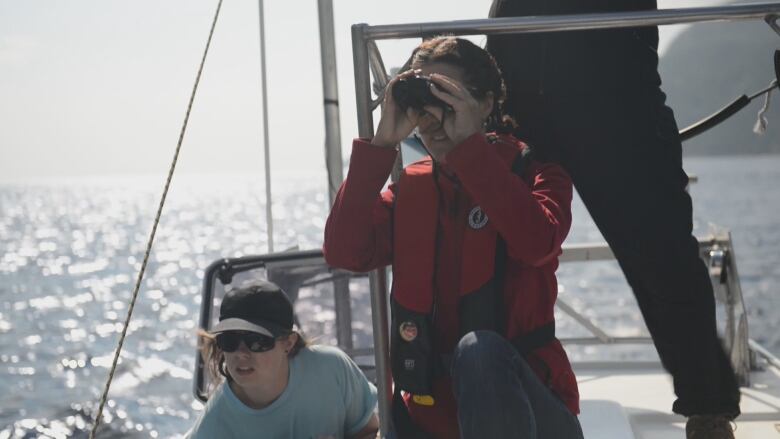Vancouver scientist leading acoustic research team to solve Beluga whale 'mystery'
Underwater noise a possible factor in deaths of endangered mammals, scientist says

It's a whale of a mystery that scientists across the country are trying to solve and one from the Vancouver Aquariumis leading the way.
Valeria Vergara,a research scientist at the Vancouver Aquarium Marine Science Centre, istrying to find out why the Beluga whale population inthe St. Lawrence Estuary is decreasingso rapidly.
Sheand a handful of other Canadian scientistsstudied the whalesin July and August, travelling to the area to explore the mystery first-hand.
"As a scientist, of course I want to help," said Vergara. "This is what one wants to do with the species you know and love for so many years."
An estimated 10,000beluga whales existed in the St. Lawrence Estuaryand Gulf prior to 1885,according toFisheries and Oceans Canada.
Thatnumber has since plummeted to around 900 officially putting it on the endangered species list this summer.

'Underwater noise' a leading theory
Vergarasays underwater noise may be contributing to the alarming number of deaths incalves.
"This population is in a very industrial area and they're probably bombarded by multiple factors at once."
During her study, Vergaradiscovered ferries, jet-skis and boats had a negative effect.
The contact calls between calves and their mothers are crucial for their survival, according to Vergara.And loud noises can easily drown them out.
"Calves make softer calls, especially when they're born and during the first week or so of life," said Vergara."They make calls that are lower in frequency."
Vergara explains why loud underwater noises could disrupt communication between calves and mother whales. pic.twitter.com/NWFdZmdeiH
—@KamilKaramaliVergara says her team was able to study the whales in a different light because of a new method to document the mammals, usinga drone that flew above the whales and dragged a hydrophoneunderwater.
"Essentially you have eyes over the water and ears under the water," she said.
"We could get information we really have never been able to get before."
Other theories for whales' decline
Vergara is focusing on whetherwhales are dying off because of underwater noise but hercolleagues on the trip tested other likely factors.
Those theories included pollution, habitat degradation andreduced food resources.
Vergara says her team hopes to find more concrete answers to prove their theories over the next few years, if they have the resources.
She adds the expedition is not government-funded, but backed by several charity and private donors.












_(720p).jpg)


 OFFICIAL HD MUSIC VIDEO.jpg)
.jpg)



























































































